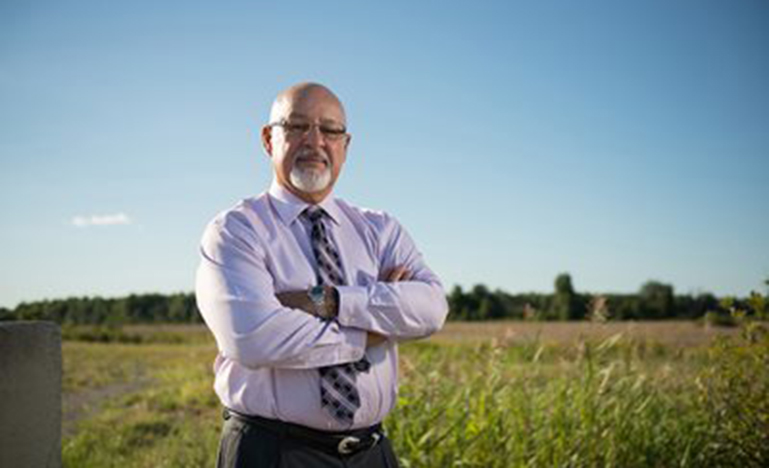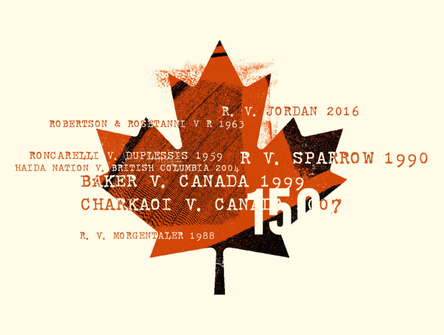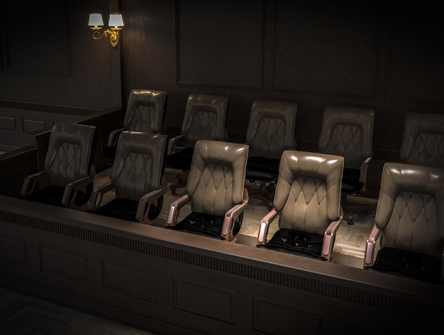Bridging worlds
Bridging worlds

When Tom Bressette was elected chief of the Chippewas of Kettle and Stony Point last year, his top priority was to reduce the number of court disputes involving native children.
For help, he turned to retired Ontario Provincial Police superintendent Ron George, a lawyer steeped in native child welfare law, experienced in conflict resolution and an advocate on aboriginal rights.
The two worked together in the early 1990s, the last time Bressette was chief and George was legal counsel for the band. A motorcycle-riding 61-year-old known as “Spike,” George was born, raised and still lives on the 3,000-member Ojibwe reserve that hugs the Lake Huron shore north of Sarnia, Ont.
“I knew I had to get a lawyer with some skill sets to handle the challenge of dealing with the children’s aid society and all the other problems we have,” says Bressette. “I told him ‘you need to come and work for us and use what you learned out there.’”
Having spent his career navigating native and non-native institutions, George believes that law and education — institutions once used to assimilate aboriginal people — can be reshaped for more constructive ends.
“If we are going to have a meaningful relationship you need to understand us and look at us through our lens and not through the lens developed by assimilationist policies and colonialism,” declares George, the third of 11 siblings and son of a residential school survivor.
He is currently completing his PhD at University of Ottawa law school, with a focus on indigenous knowledge and legal traditions in promoting First Nation healing.
In July, 2013, he began a three-year stint as Ron Ianni Scholar-in Residence at the University of Windsor law school, where he has lectured on aboriginal legal issues for the past 11 years. As scholar-in-residence, he has been asked to raise the profile of aboriginal issues at a law school known for social justice advocacy, and to assist with its evolving strategy to collaborate with local First Nation communities on legal issues of mutual interest.
In June 2012, lured out of a brief retirement by the chief, George agreed to serve as legal counsel for Kettle and Stony Point until 2015, with added responsibility to represent it in child custody hearings. He also provides legal advice on economic development (including a proposed golf-course complex) and risk management, such as training for staff and elected officials to limit financial liability.
But his first assignment was to end the band’s long absence as a participant, as is its right, in court cases under the Child and Family Services Act and to address frayed relations with the Sarnia-Lambton Children’s Aid Society.
“We had had a 30-40-year fight with the CAS and I said it is going to change,” says George. “We are going to be conciliatory, [but] we are going to be focused and determined,” he said of overtures to agency officials. “We have a strong resolve but we want you to partner with us.”
The CAS, with a new executive director and a fresh commitment to outreach that includes First Nation representation on the board of directors, had equally fervent ambitions.
“The history has been horrific between children’s aid societies and indigenous communities in our country,” declares Dawn Flegel, executive director of Sarnia-Lambton CAS, citing over-representation of aboriginal children in care. With an opening from the band, she says, “there was an opportunity and we grabbed it to say ‘we can do different and we can do better.’”
A recent case illustrates the evolving relationship.For a proposed adoption of a native Crown ward by a non-native family, George filed a statement with the court describing First Nation principles about children and their relationship to the Creator. He also submitted a sealed letter from the Kettle and Stony Point chief for the child to read at age 18 to learn more about her ties to the band.
Notably, the band’s documents were not subject to approval by Sarnia-Lambton CAS. “We have tried to recognize in our court cases with Kettle and Stony Point to be very careful to say we don’t adopt those [First Nation] principles,” says Jennifer Thrasher, CAS manager of legal services. “They are theirs, not ours, to appropriate.”
Judge Anne McFadyen, who presides in the family court of the Ontario Court of Justice in Sarnia, says “I have noticed a willingness to mediate in a culturally sensitive manner and work at the issues they can and continue to meet over time to chip away at the outstanding issues.”
In mid-2013, Sarnia-Lambton CAS reported 34 court matters involving aboriginal children, down from 45 in December, 2012.
George credits his ability to operate in native and non-native worlds to his spiritual membership in the Turtle Clan, which he describes as “people responsible for bridging worlds and moving in and out of different environments.”
Growing up, he aspired to become a lawyer but saw no role models. “It was difficult to pursue something where it did not appear like that was possible,” he says.
In 1976, he joined the Ontario Provincial Police as a First Nation constable at Kettle and Stony Point, serving for 15 years. In that time, he took time off to earn a degree in sociology from the University of Western Ontario in 1987 and a degree from its law school three years later. He was called to the bar in 1992, the first status Indian in the London area to do so, returning home to set up a private practice. “I felt very strongly that I needed to come home so that younger people could see that we could do it,” he says.
In his view, the law needs to recognize the value of aboriginal legal traditions not only for First Nation people but to promote “respective and meaningful relationships” with non-natives. “The law created social imbalances, and maintained those social imbalances so how do we heal going forward?” he asks. “Is it possible the law can help? My answer is yes, but the law has to be based on aboriginal legal traditions for indigenous people.”
He cites the legal system’s handling of the death of his father, killed off-reserve in 2002 by a driver who “blew” a stop sign. The court penalty was a six-month licence suspension. Under aboriginal traditions based on reconciliation, not blame, George says the driver would have to meet the family and offer life-long reparations — “as nominal as $25 a month” — to the widow.
“The legal community — and that includes law schools, students, administrators, lawyers, judges and law associations — needs to get access to more accurate information about aboriginal people,” he says. “Then you can begin the development of establishing relationships based on truth and respect for one another.”
His philosophy applies to policing too.
In 1995, his cousin Dudley George was killed by an OPP officer in a land-claims protest at Ipperwash Provincial Park, nine kilometres northwest of Kettle and Stony Point.
Two years later, in a wider effort to repair relations with aboriginal communities, the OPP recruited Ron George back as an inspector/special adviser on First Nation policing and later as a superintendent with responsibility for aboriginal liaison-operations. “It was the same old thing for me,” he says of rejoining the OPP. “We need to share information and we need to understand each other and develop relationships based on this understanding that are respectful and honest.”
But don’t mistake his outlook for a lack of resolve on aboriginal issues. Standing on a hillside on the Kettle and Stony Point reserve, George barely conceals his anger as he recounts the history of two nearby buildings, vacant since 1963, that housed the federal government-run residential day school he attended through Grade 4. “We learned about Dick and Jane and mother and father and their dog Spot, but never did we hear about people like us and people living like us,” says George, who says he still suffers from having teeth pulled — without anesthesia as he recalls — by a dentist for the school.
He hopes the white frame buildings, former “beacons of colonialism,” soon can be re-imagined for a positive purpose.
This fall, the band plans to tear down the buildings and replace them with a multi-agency facility that includes space for Kettle and Stony Point to tell its history. “We are going to take this colonial picture and we are going to recreate a picture of who we are based on our values and principles,” says George.


